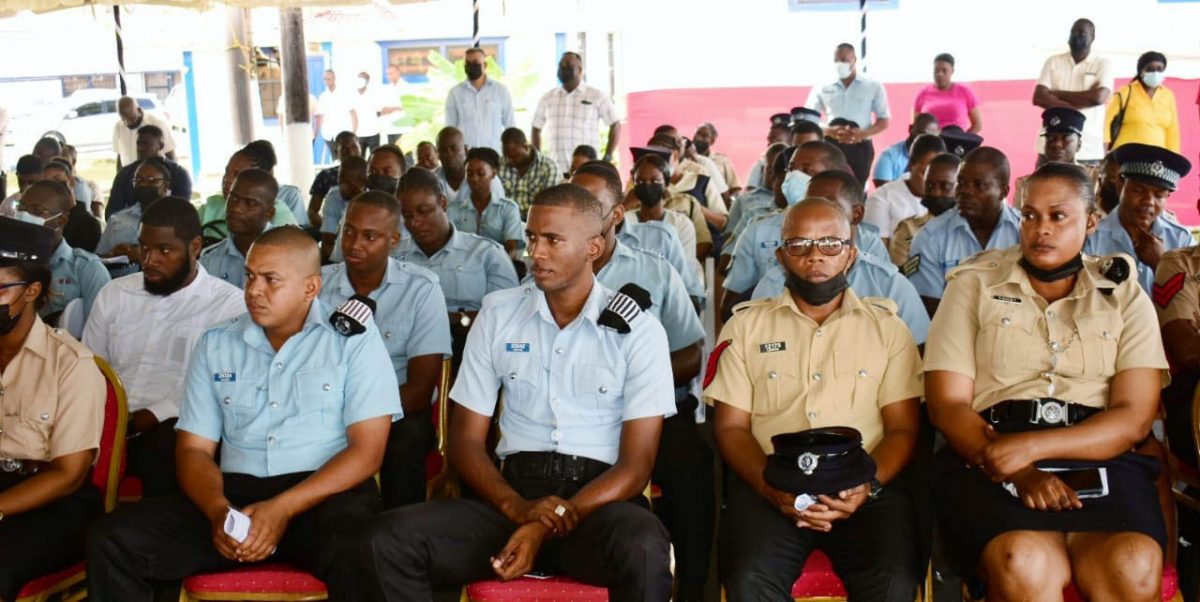Reminding that much work needs to be done to meet the demands of the public, acting Commissioner of Police Clifton Hicken has warned Guyana Police Force (GPF) ranks that that anyone found in breach of the established Standard Operating Procedures (SOPs) will face the consequences. “When you go outside of the realm of the law… we are going to bring you back in line based on recommendations coming from our legal advisors,” Hicken was quoted as saying during his address at GPF’s 183rd anniversary awards ceremony held on Friday at the Tactical Service Unit Square, Eve Leary, Georgetown.
Hicken also told his audience that in this age of technological development “nothing is private anymore,” and advised that professionalism is the key in the execution of their mandate.
During his address, Hicken acknowledged the GPF’s many successes but he also admitted that it is currently facing several challenges, including “inadequacy of human resources.”
Hicken informed the gathering that in an effort to address the issues, training has commenced across the regions. He noted that the public can expect to see police officers in a “more visible way, responding more than ever” with the addition of a number of vehicles soon.
“We remain resolute on the path of reform and you must continue to ensure that service to the nation is at the highest level of professionalism, trust and integrity,” Hicken exhorted the gathering while reminding that the mission of the force is to improve service to the public.
“Of course we are going to extend our arms to achieve as much partners that we can so we can work together to move in one direction of transparency, accountability and professionalism for this noble organisation.”
He also urged members of the Force to strengthen their commitment to the oath they took to serve and protect the nation.
However, in spite of the force’s successes thus far, Hicken cautioned that there is much work still to be done. “Of course added with the budget constraints, emerging security threats, among others, however, there is still much work to be done if we are going to meet the challenges and demands by members of the public and international best practices,” he said.
The GPF’s public image continues to take a battering as a result of the unlawful actions of members of the force, with the most recent high profile case being that of Lance Corporal Kristoff DeNobrega, who was charged with the murder of Quindon Bacchus, and two of DeNobrega’s colleagues, Lance Corporal Thurston Simon and newly promoted Cadet Officer Dameion McLennon, being charged with obstruction of justice based on the allegation that they tried to cover up the manner in which Bacchus was killed.
In order to boost information sharing and joint operations, Hicken disclosed that the GPF intends to increase its strategic alliance with local, national, and international agencies. Further, and importantly, departments and units within the force will soon be available in all policing divisions. This, he said, will be done so that the regions won’t be dependent on support from Police Headquarters to deal with any issues. “Decentralisation of departments from Headquarters to all the regions… this is very critical if we are to achieve our objective.” In addition, police stations will continue to be enhanced and rehabilitated to cater for persons living with disabilities and also victims of abuse.
Hicken noted that the implementation of society-based crime prevention programmes are “critical” now more than ever. “Integration of the public is necessary. And so when the police are going through challenges, rather than having barriers out there with the public, we are going to have them bridged… so they can support our cause,” he said. Against this background, he urged police officers to get out of their offices and get into the communities, “so that we can take reports from those who are not coming to the station and that is important so that our data would not be questioned.”






